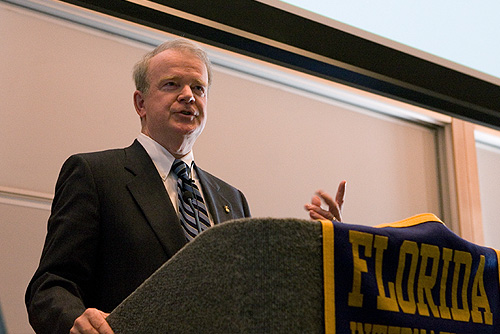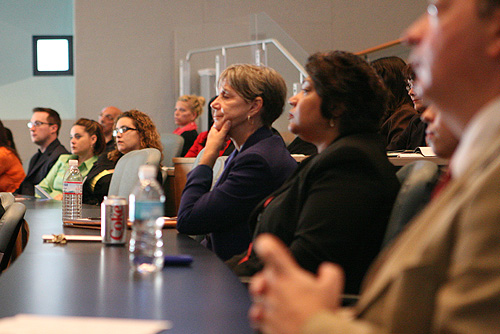What are we going to do about our health care system?
It’s a question being raised throughout South Florida and across the United States—from kitchen table to conference room table. The right answer is not easy to come by—but pinpointing problem areas offers a valid starting place.
[flv:http://itv.fiu.edu/uploads/XlTwNBFQEHYhRfS5eSP3.flv 500 334]
In a recent Wertheim Lecture, Brian E. Keeley, president and chief executive officer, Baptist Health South Florida, identified the top three health care issues demanding attention: access, quality, and cost.
“The reality is, our national health care system is broken,” Keeley said. “It needs a comprehensive fix…not just a tweak.”
The challenges are widespread—ranging from figuring out how to provide coverage to millions of uninsured citizens to controlling skyrocketing costs.

What drives the high cost of health care today?
According to Keeley, the United States spends 50 percent more on health care than any other advanced country.
“At the same time, ours is the only advanced country that does not provide universal health care,” he said.
Keeley outlined factors contributing to the rise in health care costs. Some are obvious—including expensive drugs, the aging of the American population, the rise in medical malpractice suits, and the availability of new technologies. Others are less obvious—such as hidden cost shifts and the over-utilization of health care by the aging baby-boomer generation.
Although dismayed to see the U.S. health care system under such duress, lecture attendee Judy Brown, research consultant with Bioheart, Inc., also was encouraged by the fact that industry leaders like Keeley see the big picture.
“Now that the powers that be in local, state, and federal government are identifying issues together, I think there is hope that in time remedies to the over-extended costs of health care will be found,” she said.
Obama administration starts to define new path.
“I met recently with President Obama’s transition team, where a number of solutions are already being debated,” Keeley said. “One idea is to move to a public/private hybrid model for health insurance coverage. Other proposed solutions include establishing a federal health board and directing funding from the recently passed stimulus package toward information technology.”
Keeley’s lecture, which drew more than 150 attendees from the academic, business, and medical communities, took place on January 29, 2009, in the college’s Ocean Bank Auditorium. The Herbert A. Wertheim Lecture Series has brought distinguished speakers and experts in business leadership and entrepreneurship to campus since 1993.
Michael Jadoo, slated to earn his BBA degree in April 2009, makes an effort to attend the lectures whenever he can.
“I appreciate getting the chance to connect with industry experts and to learn new things outside the classroom,” he said.





